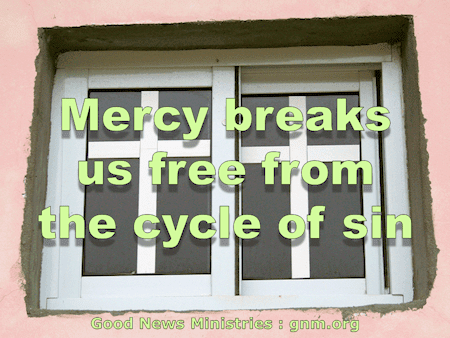Friday of the Thirteenth Week in Ordinary Time (July 6, 2018): Getting ready for mercy
Thứ Năm, 05-07-2018 | 14:45:14

Today’s Readings:
Amos 8:4-6,9-12
Ps 119:2,10,20,30,40,131
Matthew 9:9-13
www.usccb.org/bible/readings/
USCCB Podcast of the Readings:
ccc.usccb.org/cccradio/
A reading from the Holy Gospel according to Matthew.
As Jesus passed by,
he saw a man named Matthew sitting at the customs post.
He said to him, “Follow me.”
And he got up and followed him.
While he was at table in his house,
many tax collectors and sinners came
and sat with Jesus and his disciples.
The Pharisees saw this and said to his disciples,
“Why does your teacher eat with tax collectors and sinners?”
He heard this and said,
“Those who are well do not need a physician, but the sick do.
Go and learn the meaning of the words,
I desire mercy, not sacrifice.
I did not come to call the righteous but sinners.”
Good News Reflection: Getting ready for mercy
Rituals, fasting, and sacrifices — what good are they if they don’t come from a heart full of mercy?
When Jesus asked the Pharisees in today’s Gospel passage to go and learn the meaning of the words, “It is mercy I desire and not sacrifice,” he was quoting Hosea 6:6. The Prophet Hosea had been sent by God to warn the Israelites that the only way to prevent disaster was by returning to the Holy Covenant, i.e., to a committed, true and faithful relationship with God.
By choosing to use the words of Hosea, Jesus drew a clear line between true followers, who walk in the ways of God day after day, and those who only run to God when they’re in trouble.
When our hearts are not fully devoted to God, we are not truly committed to being holy. Any remorse that we feel because of the troubles we’ve caused, and any acts of repentance that we do, are basically just a theatrical performance: We’re trying to convince God and the people around us (really, to convince ourselves) that we deserve mercy, a second chance, or a third or fourth or fortieth chance, so that we’re relieved of the feelings of guilt. We get the business of holiness out of the way and soon return to whatever caused the trouble in the first place.
This attitude is like a man with an ulcer; he runs to the doctor for a cure, but he does not change the stressful lifestyle that created the ulcer. We reap what we sow. It’s like the friend who apologizes in order to get invited over again; it’s only a matter of time before he or she stirs up trouble again.
When selfish gain is our motive, rather than concern about how our sins have affected others, we stay in the cycle of sinfulness. We remain outside the realm of God’s mercy.
This is so important, read that last paragraph again! Until we’re actually concerned about how our sins have affected others, we stay in a cycle of sinfulness and we remain outside the realm of God’s mercy.
Jesus said, “I desire mercy, not sacrifice. I did not come to call the righteous but sinners.” We can do all the right things and still be far from God. We can ask for something in prayer and back it up with fasting, but if we don’t care about how our sins affect others and we don’t use the fast to discipline the weaknesses of our flesh, we’re only using the food sacrifice as an attempt to bribe God into answering our prayers.
To be a follower of Christ, God’s mercy has to enter into our whole being, right down to the core, deep in the heart where real change occurs. It has to become a living, growing gift that exudes outward toward everyone else.
My Lord, may my greatest wish be to remain near You, and may I always look for You with all my strength. Fill me with Your mercy, Jesus, to give it to others. Amen.
© 2018 by Terry A. Modica
Tags: Good News Reflection, Holy Gospel according to Matthew, Thirteenth Week in Ordinary Time
Có thể bạn quan tâm
- Thursday of the Thirteenth Week in Ordinary Time (July 5, 2018): Overcoming obstacles
- Wednesday of the Thirteenth Week in Ordinary Time (July 4, 2018): Stop living in the tombs
- Tuesday of the Thirteenth Week in Ordinary Time (July 3, 2018): Feast of Saint Thomas, Apostle
- Monday of the Thirteenth Week in Ordinary Time (July 2, 2018): Getting ridiculous with Jesus
- Thirteenth Sunday in Ordinary Time, Year B (July 1, 2018): How to touch the hem of Jesus' garment
- Saturday of the Twelfth Week in Ordinary Time (June 30, 2018): Under my roof? (Why do we quote the centurion?)
- Friday of the Twelfth Week in Ordinary Time (June 29, 2018): Solemnity of Saints Peter and Paul, Apostles
- Thursday of the Twelfth Week in Ordinary Time (June 28, 2018): Memorial of Saint Irenaeus, Bishop and Martyr
- Wednesday of the Twelfth Week in Ordinary Time (June 27, 2018): What it means to be a true prophet
- Tuesday of the Twelfth Week in Ordinary Time (June 26, 2018): The Golden Path
- Monday of the Twelfth Week in Ordinary Time (June 25, 2018): Taking the specks from others' eyes
- Twelfth Sunday in Ordinary Time, Year B (June 24, 2018): Solemnity of the Nativity of Saint John the Baptist.

